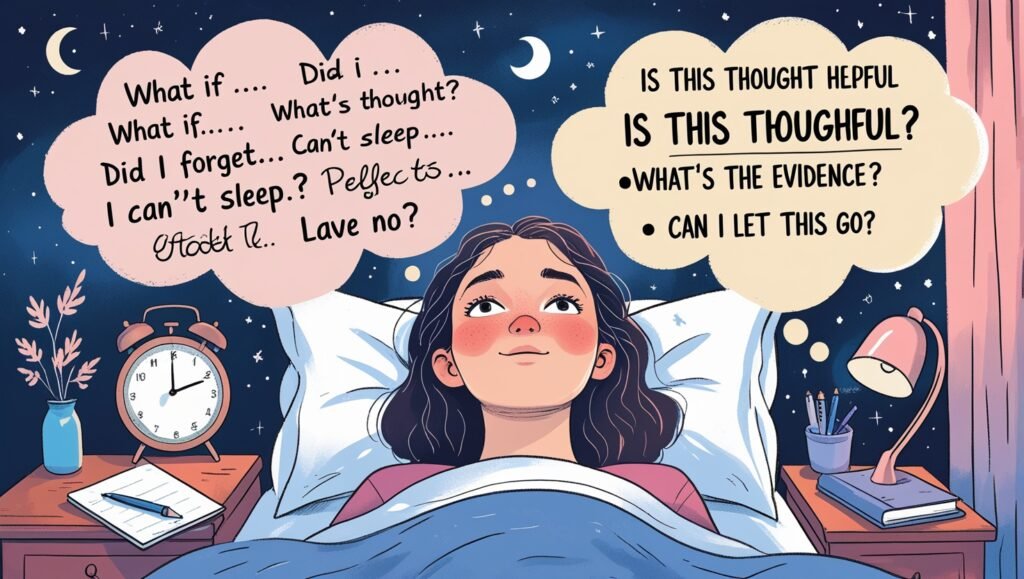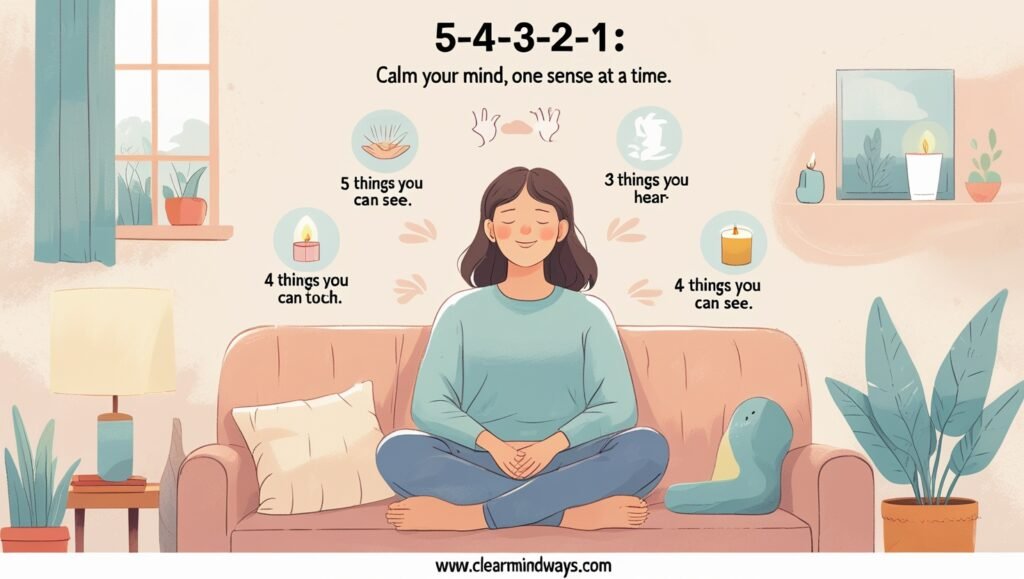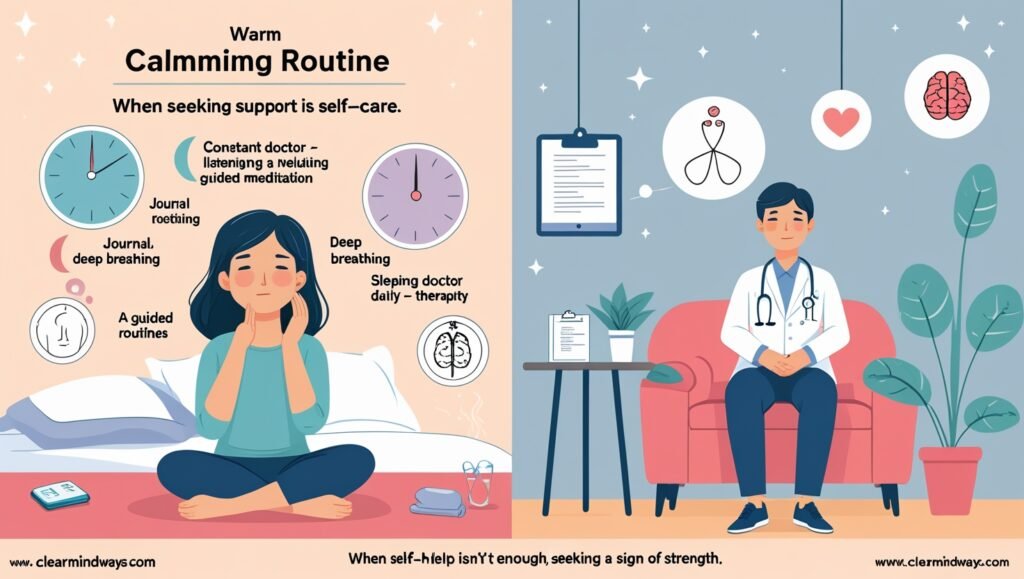If you’re lying in bed with a mind racing, rehashing conversations, fretting about tomorrow or analyzing every detail of your day, you have plenty of company. There are millions of people out there that can’t shut down their mind at night, and it’s one of the most common causes of poor sleep. I Understand Your Pain, Believe Me: How To Stop Overthinking At Night! Yet, learning how to stop overthinking at night, is paramount to keep your sanity and your health too.
When your brain refuses to chill out at night, it can start to feel like a vicious cycle: The more you think, the more you worry, and the more you worry, the more difficult sleep becomes. This complete guide will equip you with 14 proven methodologies to break the cycle and get your peaceful nights back!
Why We Overthink When We Go To Bed
Before we get to solutions, let’s pause briefly to consider why our minds become so active when we are trying to sleep. Throughout the day, we’re engaged in tasks, conversations, and activities that keep our thoughts from creeping into dark territory. Finally we lie down in a dark, quiet room, and our brains suddenly have the space to process everything that happened.
This natural half-life of processing can turn quickly into overthinking, particularly if you’re managing stress, anxiety, or unresolved issues. You might then ruminate from one worry to the next, in what psychologists call rumination — repetitive thinking that doesn’t solve anything but does escalate anxiety and interfere with sleep.
14 Things to Do Before Bed to Prevent Overthinking at Night
1. Create a Wind-Down Routine

One of the best ways to prevent overthinking at night is to develop a regular pre-bedtime routine. Begin this practice 1-2 hours before the time you want to go to sleep. This tells your brain to shift from its daytime activity to its nighttime activity.
Your routine:
- Taking a warm bath or shower
- Reading a book (no screens!)
- Gentle stretching or yoga
- Listening to calming music
- Journaling
- Meditation or deep breathing techniques
The key is consistency. And, because you’re doing the same thing day after day, your brain starts to link these activities with sleep and the process of calming your racing mind becomes easier.
2. Try Doing a ”Brain Dump”

If you have trouble turning off those thoughts at night because your mind is full of to-dos, worries or other stimulations, try a brain dump. Leave a notebook and pen by your bed, and when the ruminations come, jot them down without judging them or even reading over them.
this works because it ~
- Helps you remove your ideas from your brain and onto the page.
- Lets you not think about this stuff until tomorrow
- Gives a feeling of relief, of free thoughts
- Enables to address concerns during right hours of the day
- Don’t worry about trying to make sense or be organized with your brain dump. The point is to clear your mind so you can rest
3. Employ the 4-7-8 Breathing Technique

When anxiety and overthinking hit at night, your breathing can be shallow and fast. The 4-7-8 breath is a simple and effective way to stimulate your body’s relaxation response and ease a racing mind.
Here’s how to do it:
- Breathe in for the count of four through the nose
- Hold your breath for 7 counts
- Breathe out through your mouth to the count of 8.
- Repeat 3-4 times
This strategy slows down your heart rate and decreases anxiety, and it also provides a specific thing for your mind to focus on that is not a worry thought.
4. Get Out of Your Thinking Cycles

The process of learning how to stop overthinking and anxiety at night usually entails identifying and challenging unhelpful thought processes. When you see that your mind is spinning, ask yourself:
- Is this a useful thought right now?
- Is there anything I can do about this issue right now?
- Am I jumping to conclusions or exaggerating the severity of the situation?
- What would I say to a friend who had these same worries?
- What evidence do I have to support or refute that concern?
By challenging your thoughts, rather than treating them as facts, you can interrupt the cycle of rumination and take back the control over your mind.
5. Progressive Muscle Relaxation Is Also an Excellent Practice

“Progressive muscle relaxation is perfect for people who have both mental and physical tension at night,” Shives says. This technique is all about systematically tensing and then relaxing various muscle groups throughout your body.
Begin at your toes and move up:
- Claw toes Tense your toes for 5 seconds, then release.
- Tighten your calves for 5 seconds and then release
- Move on to your thighs, stomach, hands, arms, shoulders and face
While focused upon the physical sensations of tenseness and relaxation, your mind will drift from those concerned thoughts, receiving relief. This approach is so powerful that many people actually fall asleep before getting all the way through the sequence.
6. Create a “Worry Time” Throughout the Day

One reason people can’t stop overthinking at night is because they haven’t given themselves permission to worry during appropriate times. “Allot 15 – 20 minutes per day to your very own, specially arranged official ‘worry time’ — ideally in the afternoon and not around bedtime,” she advised.
During this time:
- Write down your concerns
- Think of what could be the solutions
- Choose what action steps you can take
- Admit fears over which you have no control
When the night time overthinking starts, tell yourself that you have already dealt with this and there is NOTHING useful you can do about your concerns a bedtime.
7. Use Guided Sleep Meditations

The guided sleep meditations are specifically created to settle your mind and ready your body for rest. Audio programs, such as these ones:
- Calming narration
- Breathing instructions
- Visualization exercises
Relaxation techniques_PROGRESSIVE MUSC ULAR Relaxation Techniques
There are many free apps and websites that provide guided sleep meditations. The narrator’s voice gives you something quiet to focus on instead of your worries, and the relaxation techniques help your body prepare for sleep.
7. Be mindful and in the now

Overthinking usually consists of either living in the past or anticipating the future. Mindfulness practices can rein in your attention to the present, which is where the majority of our concerns actually don’t exist.
Give these mindfulness activities a try the next time you’re thinking too much at night:
- Concentrate on the physical feelings of lying in bed
- Name five things you can hear, four things you can touch, three things you can see (even in the dark), two things you can smell, and one thing you can taste.
- Just notice your breath without attempting to control it
- Do a body scan, focusing on any tension or relaxation.
8. Control Caffeine and Screen Time

Your daytime routine can make or break your efforts to stop overthinking at night and sleep better. Caffeine stays in you for 6-8 hours, so try not to consume coffee, tea or energy drinks after 2 PM if you go to bed at around 10 PM.
Likewise, the blue light that emits from your phone, tablet, computer, and television could interfere with your body’s ability to produce melatonin, the hormone responsible for sleep. Create a “digital sunset” at least one hour before sleeping, or wear blue light blocking glasses if you have to use screens.
9. Establish a Good Sleeping Environment

Your sleeping environment is the unsung hero in how easily you can still your mind at the end of the day. Set your space up for sleep by:
- Gently Wash the box in sof water Other wise Keep the roon cool(65-68°F is perfect)
- Blocking lights with blackout curtains or an eye mask
- -Reducing noise with earplugs or a white noise device
- Making sure your mattress and pillows are comfortable
- Taking all of the clocks away so she didn’t have to look at the time
- Infusing soothing scents such as lavender
When your environment is conducive to sleep, it’s easier to move from wakefulness to light sleep without also rolling through the mud of anxious overthinking.
10. Use the 5-4-3-2-1 Grounding Method

When anxiety and overthinking feel overpowering, grounding yourself in the present can snap you back to reality. The 5-4-3-2-1 method activates your senses to break recurring, spiraling negative thoughts:
- Name 5 things you can see
- Name 4 things you can touch
- Name 3 things you can hear
- Name 2 things you can smell
- Name 1 thing you can taste
The method is effective because it directs your attention from internal concerns to external, concrete sensations, which can help to calm your nervous system.
11. Use Positive Visualization

But instead of drifting off into worries and problems, you can take control and guide your mind to positive, peaceful imagery. Some methods of visualizing for sleep may be:
- Picturing yourself somewhere calm and beautiful (such as a beach or forest)
- Picturing a positive resolution to the thing you are worried about
- Generating in your mind a “safe place” where you are totally relaxed
- Picturing your concerns floating away as clouds or balloons
The secret is to involve different senses of your visualization – what are you seeing, hearing, smelling, and feeling inside of your peaceful headspace?
12. Tackle the Root of Anxiety and Stress

Persistent nighttime brooding sometimes is a symptom of more general anxiety or stress that needs professional treatment. If you are always struggling to stop overthinking at night despite trying a bunch of other methods, keep in mind:
- Talking to a therapist
- Getting into CBT (which is very effective for overthinking and anxiety)
- Talking over your worries about sleep with your physician
LIFE negative/positive lifestyle related factor Negative or positive possible lifestyle related factors for stress were explored along with sources.
Learn more coping mechanisms for controlling anxiety.
There’s nothing wrong with reaching out for support — lots of individuals work with therapists to learn how to better manage overthinking late at night in a way that suits them best.
13. Practice Self-Compassion
And don’t forget to be gentle with yourself as you practice putting an end to your nighttime overthinking. Becoming angry with yourself for having a rushing, tic-tacking mind simply adds another level of stress to the whole ordeal and makes it more difficult to rest.
Rather than getting into a battle with your thoughts, experiment with softening around them, accepting them, with nonjudgment. Your brain is attempting to solve, and keep you safe from, problems — even if your brain’s timing is terrible. Treat yourself with the same kindness you would a good friend who was facing similar difficulties.
14. Building Long-Term Success
Figuring out how to stop overthinking at night isn’t usually something that happens overnight (literally, but hopefully also figuratively). It requires practice, and patience, to cultivate new mental habits. Here’s some advice for long-term success:
- Begin with one or two methods, instead of attempting all at once
- Don’t change your strategies to often Try them for a solid 2-3 weeks before you decide if they’re working or not
- Maintain a sleep journal of what is most successful for you
- Do what suits you in your particular type of overthinking based on what you start to learn from talking to your friends.
- Focus on making and celebrating gains without aiming for perfection.
Keep in mind that some nights are better than others and that’s perfectly okay. The objective is not to go to sleep every night without another anxious thought, but to build a portfolio of reliable tools for managing the thoughts when they do occur.
When to Call a Professional

Although the approaches in this guide are suitable for the majority of sufferers there are times when professional help can be beneficial. You may want to consult with a doctor if:
- You overthink at night despite diligently working with these tactics
- You are experiencing long-term problems sleeping, which are affecting your life, job or relationships.
- You’re suffering from anxiety or depression in addition to nighttime worrying
- You’ve been using alcohol or other substances to sleep
- You have physical symptoms such as chest pain, a racing heart, or trouble breathing along with your nighttime anxiety
A mental health provider can help you explore underlying reasons for your overthinking and devise a customized treatment plan that may involve therapy, medication or other treatments.
FAQS
Why We Can’t Stop Overthinking at Night?
Nighttime overthinking is so common, because when you lie down to sleep, your brain finally has some quiet space to process the day. You get busy with your work during the day, busy with your tasks, and busy with the people you live with, and so on. Also, darkness and silence can make things feel more extreme, and lying still can be an invitation to let your mind drift from one worry to another.
How Long Does It Take to Reach a Stage Where You No Longer Overthink at Night?
Everyone is different, but most people begin to see days where worry is less taking over, and calm is more at their side, within 2-3 weeks of doing all these exercises daily. A few people may start to feel the effects even earlier, but for others, it might take 4-6 weeks to begin overwriting past mental habits. The secret is consistency – using the same tools every night helps your brain develop new, pre-sleep habits.
What can I do when I wake up in the middle of the night when I’m overthinking?
If you wake up in the middle of the night with your mind racing, try not to check the clock (it can increase anxiety) and practice the 4-7-8 breathing technique or progressive muscle relaxation. (Can’t quiet your mind after 15 to 20 minutes? (If you can’t quiet your mind after 15 to 20 minutes, get up and do a quiet, non-stimulating activity like reading or light stretching until you feel sleepy.) Keep the lights off and the screens away.
Is it normal to think too much almost every single night?
I tend towards overthinking at night about things that don’t matter, and I can’t get to sleep. “A general threshold of 20 minutes of sleeplessness before becoming engaged in some activity, whether work, reading, etc., is not ideal, but it may indicate you have some success at managing a racing mind,” Charles Morin, professor of psychology and director of the Sleep Research Center at Laval University in Quebec, Canada, told Mashable. If you find you’re consistently unable to stop yourself from overthinking late at night after trying different strategies for a few weeks, consider talking to a healthcare professional.
Is overthinking at night a sign of anxiety?
Yes, you need reminders like I have that this unwanted nighttime overthinking can cause you physical problems like a racing heart, sweating, tight muscles, headaches, and digestive problems! These symptoms arise because overthinking triggers your body’s stress response system. The deep breathing and relaxation methods described in this guide can assist with both the physical and mental symptoms associated with nighttime anxiety.
How is normal worry different from overthinking?
Healthy fear is targeted problem-solving that ultimately leads to action or acceptance. Overthinking consists of dwelling on circular thoughts that don’t lead to solutions and frequently make problems feel worse. Overthinking often involves “what if” scenarios, catastrophic thinking, and ruminating about things in the past that you can’t change.
If you overthink at night, should you refrain from taking naps?
When you’re dealing with overthinking at night and sleep problems, it’s usually best to try to stay away from naps after 3 PM or to keep them short (20-30 minutes) if you take one earlier in the day. Long or late naps can diminish your drive to sleep at bedtime because, well, you’re not as tired as you should be when you should be winding down.
Can it get worse with certain foods at the evening meal?
Well, yes, certain foods and drinks can lead to late-night overthinking. Caffeine (even from an afternoon coffee), alcohol, spicy food, and big meals right before bedtime can all impede the quality of your sleep and make it more difficult to quiet your mind. Enriched or richer foods can cause discomfort, which keeps the mind awake.
How do I not overthink about overthinking?
This meta-worry is very common and getting anxious about your anxiety just adds another layer of stress. Be gentle with yourself, and bear in mind that having worried thoughts doesn’t mean anything is wrong with you. And accept that some nights will be more challenging than others, and focus on using your coping techniques rather than beating yourself up over a racing mind.
How about if my overthinking comprises real problems to solve?
While some concerns are justified, nighttime is not the time for problem-solving. Your brain is less than sharp when you are tired, plus the quiet darkness often makes problems feel stronger than they are. Practice the “worry time” method: You designate 15-20 minutes during the day to address worries and make plans for what to do about them, and then remind yourself at bedtime that you have already made time to take care of problems.
Do meditation apps actually help with nighttime overthinking?
Yes, meditation and sleep apps can be extremely useful for nighttime overthinking. They offer guided meditations, sleep stories, breathing programs, and relaxing music, perfect for quieting frantic minds. The narrator’s voice provides your brain something calming to latch onto, versus worries, and the techniques work to help turn on your body’s relaxation response.
Do I need to get out of bed, or should I just lay down, if I can’t get out of my head?
If you have been lying in bed tossing and turning for more than 15 to 20 minutes and don’t feel yourself nodding off to sleep, then it’s generally recommended that you get up and do a quiet, relaxing activity until you feel tired again. This trains your brain not to connect your bed with worry and anxiety. Select options such as reading, light stretches, relaxation music – stay away from screens and bright light.
Conclusion
Nighttime overthinking is a common problem. But it doesn’t need to control your sleep or your life. You can discover how to stop overthinking at night and get the restful, restorative sleep you need simply by employing these 14 strategies, from establishing a wind-down routine to practicing mindfulness and seeking professional help when it’s called for.
And keep in mind that it may take time to discover the perfect mix of approaches for you. If there’s anything I can say to you, it’s to be patient with yourself, try to be consistent, and don’t be afraid to tweak what you’re doing so that you can find what works best for you. With commitment and the right strategies, you can escape the cycle of nighttime overthinking and feel refreshed and ready to tackle each new day.
Sweet dreams are made of those who make of their nighttime thoughts an exercise in control and space for rest and replenishment. Your path to better sleep begins tonight.
